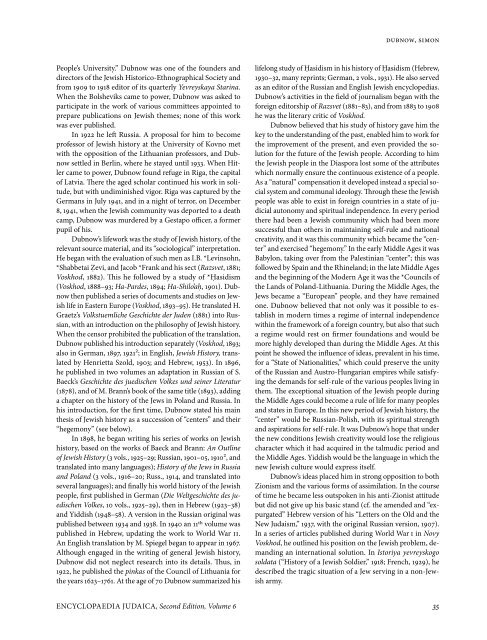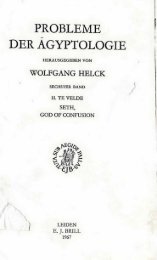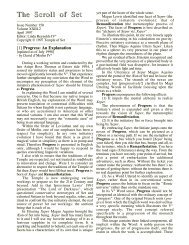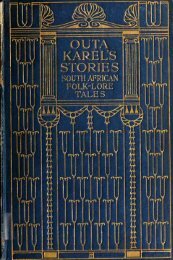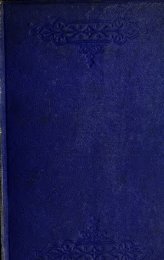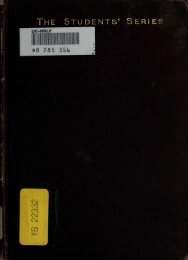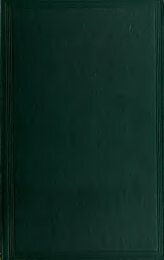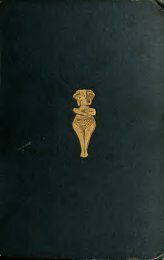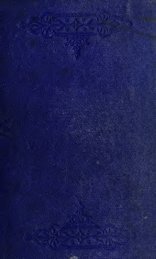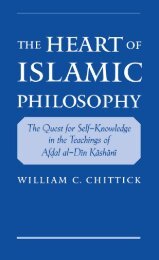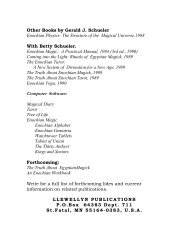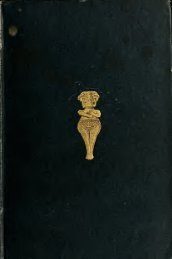- Page 3 and 4: ENCYCLOPAEDIA JUDAICA
- Page 5 and 6: ©2007 Keter Publishing House Ltd.
- Page 7 and 8: DRA (Draa), river valley region in
- Page 9 and 10: North African origin established th
- Page 11 and 12: fiture of that people. Ancient Near
- Page 13 and 14: of residence were limited. Neverthe
- Page 15 and 16: (F. Thureau-Dangin, Arslan Tash (19
- Page 17 and 18: a baggy chemise reaching down to th
- Page 19 and 20: One such tiara, belonging to a Jewi
- Page 21 and 22: dereau incriminating Dreyfus had be
- Page 23 and 24: (Red Sox) meet the National League
- Page 25 and 26: (1919-27), and Philadelphia (1927-2
- Page 27 and 28: Republican Party of Pennsylvania, D
- Page 29 and 30: 23:19-21:29-35; 31:4-5; cf. I Esd.
- Page 31 and 32: July 2, 1942, the Germans surrounde
- Page 33 and 34: and communion with God is possible
- Page 35: chequer of the Jews at Westminster
- Page 39 and 40: assimilation, its leaders were forc
- Page 41 and 42: In the 18th century the Jewish popu
- Page 43 and 44: of the community were learned and r
- Page 45 and 46: Prophets (1911), all of which conta
- Page 47 and 48: Saints in World Religions (2000), 3
- Page 49 and 50: °DUNANT, JEAN HENRI (1828-1910), S
- Page 51 and 52: a medical work by Dunash, and there
- Page 53 and 54: Ḥayyim; “The Fountain of Life
- Page 55 and 56: the top of the tree-vine since leav
- Page 57 and 58: in Parthian dress (Mordecai, Ezekie
- Page 59 and 60: eral Christians of the period under
- Page 61 and 62: his voice against his own countryme
- Page 63 and 64: DURAN, SOLOMON BEN SIMEON (known as
- Page 65 and 66: a wooden house in 1905. In 1921 it
- Page 67 and 68: 1916 went to Europe as a secretary
- Page 69 and 70: heresy of the Sadducees developed.
- Page 71 and 72: the novel De wandelende Jood (1906)
- Page 73 and 74: A fine autobiographical novel on th
- Page 75 and 76: the law originating in God and the
- Page 77 and 78: sial, Dworkin holds that nonetheles
- Page 79 and 80: tury, the Salonika dye industry dec
- Page 81 and 82: 1983 he reportedly returned to his
- Page 83 and 84: EAGLE, bird of prey of the genus Aq
- Page 85 and 86: aoh. It likewise swallowed up the v
- Page 87 and 88:
Add. Bibliography: R. St. John, Eba
- Page 89 and 90:
Whenever a new Semitic language is
- Page 91 and 92:
the book was written in Aramaic and
- Page 93 and 94:
(1983). An English translation by A
- Page 95 and 96:
the man sold his land. One day, as
- Page 97 and 98:
noise, when it is possible to moder
- Page 99 and 100:
of land. The quality of some ancien
- Page 101 and 102:
In contrast, the Aramaic papyri of
- Page 103 and 104:
existing trends rather than of any
- Page 105 and 106:
ar Ilai, who reported this saying,
- Page 107 and 108:
Methods of tax collection aggravate
- Page 109 and 110:
ecognize defects, whether inflicted
- Page 111 and 112:
ing, therefore, that during his vis
- Page 113 and 114:
leys, and other maritime vessels.
- Page 115 and 116:
troversies between lenders and debt
- Page 117 and 118:
main ethically and psychologically
- Page 119 and 120:
Torah holds a higher place in Germa
- Page 121 and 122:
and more severe constraints. The pe
- Page 123 and 124:
states. Two major factors contribut
- Page 125 and 126:
upon general economic conditions, i
- Page 127 and 128:
and trying to control the market. T
- Page 129 and 130:
in some cases revealed the strength
- Page 131 and 132:
ut influential minority of the Jews
- Page 133 and 134:
the large-scale industrial establis
- Page 135 and 136:
tury and later, agriculture in Euro
- Page 137 and 138:
to behave according to previously e
- Page 139 and 140:
they actively sought an improvement
- Page 141 and 142:
identity, but maintained their cons
- Page 143 and 144:
Quito and in Guayaquil Zionist orga
- Page 145 and 146:
admirer of Disraeli that, in 1972,
- Page 147 and 148:
Bibliography: Rejzen, Leksikon, 2 (
- Page 149 and 150:
R. Samuel b. Ali, head of the Baghd
- Page 151 and 152:
tions. In accordance with a special
- Page 153 and 154:
In 1928, a second congregation was
- Page 155 and 156:
history of Israel. These two types
- Page 157 and 158:
FROM JEHOSHAPHAT TO AHAZ. There is
- Page 159 and 160:
Hasmonean wars the Idumeans assiste
- Page 161 and 162:
above sea level, with a population
- Page 163 and 164:
individual psychology. Ferdinand Bi
- Page 165 and 166:
nature of biblical educational inst
- Page 167 and 168:
seph; Leah and Reuben). While sibli
- Page 169 and 170:
The importance of alphabetic writin
- Page 171 and 172:
goals of their training. Before mar
- Page 173 and 174:
introduced by Simeon b. Shetaḥ, t
- Page 175 and 176:
This entire educational enterprise,
- Page 177 and 178:
law where it was obscure and diffic
- Page 179 and 180:
Troyes, France) in his ordinances r
- Page 181 and 182:
Jewish occupations and mobility, bu
- Page 183 and 184:
the modern period, 1800-1939 Genera
- Page 185 and 186:
toward the end of the century it ca
- Page 187 and 188:
Another large school system was tha
- Page 189 and 190:
As a result of all these factors th
- Page 191 and 192:
ward the first such school was open
- Page 193 and 194:
(The Occident). Improvements in pri
- Page 195 and 196:
British children’s author Lady Ka
- Page 197 and 198:
association - and most assuredly, t
- Page 199 and 200:
Ner Israel of Baltimore (1934), and
- Page 201 and 202:
ization. By the closing decades of
- Page 203 and 204:
which “scientifically” demonstr
- Page 205 and 206:
tential student pool owing to the e
- Page 207 and 208:
ing the 1870s a Society for Hebrew
- Page 209 and 210:
Olam) were in the Greater London ar
- Page 211 and 212:
conducted in the secular settings o
- Page 213 and 214:
der the SABJE) in Johannesburg and
- Page 215 and 216:
tion. In the early 21st century the
- Page 217 and 218:
adjudicated by the sages, possess s
- Page 219 and 220:
itself a “weekly journal.” The
- Page 221 and 222:
dence with his relative Moses *Sofe
- Page 223 and 224:
20). That the blood of the slain mu
- Page 225 and 226:
6. Second Intermediate Period - Dyn
- Page 227 and 228:
By the end of the eighth century B.
- Page 229 and 230:
Hellenistic period Medieval period
- Page 231 and 232:
(b) Egyptians, the lowest class, wh
- Page 233 and 234:
In 1036 the grandson of al-Ḥākim
- Page 235 and 236:
held key positions in the financial
- Page 237 and 238:
M E D I T E R R A N E A NS E A Alex
- Page 239 and 240:
48:28). It is also described as the
- Page 241 and 242:
I am a Russian writer,” implying
- Page 243 and 244:
sey (1901-2) and served as recordin
- Page 245 and 246:
Emanu-El (Richard’s father), conf
- Page 247 and 248:
Paul Ehrlich and William Bulloch: A
- Page 249 and 250:
director of Florida Hillel Foundati
- Page 251 and 252:
With the outbreak of war, *Himmler
- Page 253 and 254:
were committed outside the territor
- Page 255 and 256:
printed under the title Or la-Yesha
- Page 257 and 258:
About half its members worked outsi
- Page 259 and 260:
It was founded in 1937 as a “*tow
- Page 261 and 262:
cal Grininke Beymelekh, and edited
- Page 263 and 264:
pletely concealed nature, and this
- Page 265 and 266:
Bibliography: Haggin, in: Music Rev
- Page 267 and 268:
during the War of Independence (194
- Page 269 and 270:
from Palestine to the camps, thus f
- Page 271 and 272:
work eight days villenage services
- Page 273 and 274:
Bibliography: G. Aronson, in: J.S.
- Page 275 and 276:
EISENSTEIN, FERDINAND GOTTHOLD (182
- Page 277 and 278:
the war that the young country must
- Page 279 and 280:
Paramount to become chair and CEO o
- Page 281 and 282:
EITAN, RAPHAEL (“Raful”; 1929-2
- Page 283 and 284:
anks seized the world’s attention
- Page 285 and 286:
eration of Palestine. A Boeing 707
- Page 287 and 288:
the language belongs to the “peri
- Page 289 and 290:
Arish’s economy, although more re
- Page 291 and 292:
of political science at Temple Univ
- Page 293 and 294:
safe houses, and he himself avoided
- Page 295 and 296:
Add. Bibliography: A. Amichal-Yavin
- Page 297 and 298:
stances, the elders protect the fam
- Page 299 and 300:
eer retrospective. It contained mor
- Page 301 and 302:
struction of the Temple. Son of the
- Page 303 and 304:
the filling in of the family ties b
- Page 305 and 306:
herself in the cistern there; altho
- Page 307 and 308:
eligious programs of Judah b. Samue
- Page 309 and 310:
the olive, providing that it is fro
- Page 311 and 312:
government representative (Ursicinu
- Page 313 and 314:
gold (I Kings 10:18). The Bible als
- Page 315 and 316:
of Roman rule of Egypt. With the he
- Page 317 and 318:
Elfman’s score, and marked the fi
- Page 319 and 320:
ELI (Heb. יִלֵ א; ֵ “[YHWH
- Page 321 and 322:
through Central Asia. Elias defined
- Page 323 and 324:
ELIAV, ARIE LOVA (1921- ), Israeli
- Page 325 and 326:
of the tannaim was a heroic age, an
- Page 327 and 328:
simple, synthetic overview of his l
- Page 329 and 330:
you, and you will merit a lofty sea
- Page 331 and 332:
ELIEZER BEN SAMSON (fl. 12th centur
- Page 333 and 334:
of Rothenburg. Zedekiah b. Abraham
- Page 335 and 336:
olstered by wonder-tales. He was fe
- Page 337 and 338:
In Jewish Folklore Many of the lege
- Page 339 and 340:
about Elijah were composed for the
- Page 341 and 342:
sponsa called Tanna de-Vei Eliyahu,
- Page 343 and 344:
weekly Torah portions and to the nu
- Page 345 and 346:
oath and was guilty of other instan
- Page 347 and 348:
Writings Over 70 works and commenta
- Page 349 and 350:
in Jerusalem; and mentions the occu
- Page 351 and 352:
in the form of sermons on the weekl
- Page 353 and 354:
y bears. Elisha was a prophet by pr
- Page 355 and 356:
y his still devoted disciple R. Mei
- Page 357 and 358:
witnessed and photographed in trave
- Page 359 and 360:
of Public Senat, the parliamentary
- Page 361 and 362:
our martyrs. I saw them coming back
- Page 363 and 364:
mayor and returned him once more to
- Page 365 and 366:
executive officer, he transferred i
- Page 367 and 368:
a shorter version of the traditiona
- Page 369 and 370:
German-Jewish Epoch, 1743-1933 (200
- Page 371 and 372:
War II. During that period, El Salv
- Page 373 and 374:
evealing fortifications (represente
- Page 375 and 376:
emanationism the ultimate product,
- Page 377 and 378:
stemmed from the utopian political
- Page 379 and 380:
their economic and social status to
- Page 381 and 382:
community leaders (rabbis, parnasim
- Page 383 and 384:
French demands imposed upon Switzer
- Page 385 and 386:
would not ask about religion and ra
- Page 387 and 388:
estrictions as are in force accordi
- Page 389 and 390:
a proper palace. The texts prove th
- Page 391 and 392:
only at Emar and Tuttul. Even at th
- Page 393 and 394:
metabolism. He contributed, with G.
- Page 395 and 396:
the field of Kabbalah. Consequently
- Page 397 and 398:
U.S. (1958), where he republished a
- Page 399 and 400:
the bliss of divine love (Saadiah G
- Page 401 and 402:
ENCYCLOPEDIAS. Encyclopedias of Gen
- Page 403 and 404:
(6 vols., 1960-61) with a supplemen
- Page 405 and 406:
the passing of various laws intende
- Page 407 and 408:
(2) The modern kibbutz of En Dor, S
- Page 409 and 410:
with a rectangular tower. This sett
- Page 411 and 412:
vit (1927). The Tel Aviv municipali
- Page 413 and 414:
in the sack of London’s Jewry and
- Page 415 and 416:
figure far higher. They formed, int
- Page 417 and 418:
several Jews have since followed hi
- Page 419 and 420:
Russian persecution was more than a
- Page 421 and 422:
on a smaller scale, and the dispers
- Page 423 and 424:
large numbers have abandoned the se
- Page 425 and 426:
ing to 6.9% in 1990. Only the Progr
- Page 427 and 428:
The sensational death of Robert Max
- Page 429 and 430:
afimovicz, an 84-year-old former ca
- Page 431 and 432:
women’s issues including domestic
- Page 433 and 434:
countries. Britain constituted Isra
- Page 435 and 436:
mous early 13th-century poem writte
- Page 437 and 438:
is, however, worth noting certain s
- Page 439 and 440:
who condoned massacres of Jews duri
- Page 441 and 442:
*Rosenberg, the East End poet who d
- Page 443 and 444:
EN-HAROD (Heb. דֹר ֲח ןיע).
- Page 445 and 446:
In its present form it is divided i
- Page 447 and 448:
the story of Melchizedek recounted
- Page 449 and 450:
Rose, in: The Spanish Inquisition a
- Page 451 and 452:
serve Jewish life especially where
- Page 453 and 454:
ine environment; nitrogen isotope b
- Page 455 and 456:
tive Law; Only Who Can Prevent Fore
- Page 457 and 458:
nity in Ephesus against the vehemen
- Page 459 and 460:
of: Geographical Survey). It is wid
- Page 461 and 462:
this office until his death. He pro
- Page 463 and 464:
munal post before he became head of
- Page 465 and 466:
cannot be identified with the Zealo
- Page 467 and 468:
and more in epitaphs. At the beginn
- Page 469 and 470:
of Nations’ International Labor O
- Page 471 and 472:
In 1923, he served as a rabbinical
- Page 473 and 474:
Responsa of Rabbi Simon b. Zemah Du
- Page 475 and 476:
and others. His contribution to the
- Page 477 and 478:
was known as “the good Jew” of
- Page 479 and 480:
ER (Heb. רע; ַ “watcher, watch
- Page 481 and 482:
a yeshivah, Neveh Shalom. Later, he
- Page 483 and 484:
central committee. He helped Charle
- Page 485 and 486:
ERRERA, LÉO (1858-1905), Belgian b
- Page 487 and 488:
tified us with Thy commandments and
- Page 489 and 490:
(SAA II; 1988); M. Luukko and G. va
- Page 491 and 492:
ESCAPA, JOSEPH BEN SAUL (1570-1662)
- Page 493 and 494:
which will render it incapable of b
- Page 495 and 496:
Israel until the latest writings in
- Page 497 and 498:
time when Judaism in Palestine was
- Page 499 and 500:
struction of the Second Temple), th
- Page 501 and 502:
the powers of evil. It seems, there
- Page 503 and 504:
liable to sin, and punishment falls
- Page 505 and 506:
lah himself will judge or every sin
- Page 507 and 508:
ESHET ḤAYIL (Heb. לִיַח תֶ
- Page 509 and 510:
Bibliography: H. Laufbahn, Levi Esh
- Page 511 and 512:
ESPINOZA, ENRIQUE (pseudonym of Sam
- Page 513 and 514:
lude to the yaḥad described in th
- Page 515 and 516:
ark was home to as many as 43 synag
- Page 517 and 518:
mission. Jews of Estella engaged in
- Page 519 and 520:
drama, Esther (1644), was written b
- Page 521 and 522:
when Stephen Langton, having divide
- Page 523 and 524:
BALTIC SEA Tallinn ESTONIA Parnu Na
- Page 525 and 526:
worked at the Oxford Institute for
- Page 527 and 528:
largely an offshoot of German Refor
- Page 529 and 530:
on which ethical literature drew fo
- Page 531 and 532:
Ashkenazi-Ḥasidic Literature The
- Page 533 and 534:
why the wicked were created; freedo
- Page 535 and 536:
with such severity. They regarded *
- Page 537 and 538:
ethical principles. On the other ha
- Page 539 and 540:
Similarly, the midrashic interpreta
- Page 541 and 542:
Yom Kippur War and also after the M
- Page 543 and 544:
no pittam. There are several distin
- Page 545 and 546:
land Historical Magazine, 15 (1920)
- Page 547 and 548:
the Jews in Soviet Russia and their
- Page 549 and 550:
Political Processes (1968). Among t
- Page 551 and 552:
ha-Darshan” frequently referred t
- Page 553 and 554:
76b, 112b), sexual intercourse (Ber
- Page 555 and 556:
ans. There is no evidence that Eupo
- Page 557 and 558:
Rise of Christianity and Islam Unde
- Page 559 and 560:
clandestinity, began to establish t
- Page 561 and 562:
ties had taken the lead in politica
- Page 563 and 564:
dictatorship and coldly organized t
- Page 565 and 566:
erential agreement with Israel for
- Page 567 and 568:
Political Cooperation The first aim
- Page 569 and 570:
Cooperation has been the best in th
- Page 571 and 572:
and references to roads. The distan
- Page 573 and 574:
had been deported to a non-existent
- Page 575 and 576:
light on the role of the rib in the
- Page 577 and 578:
construction and ignores the mythol
- Page 579 and 580:
The Australian delegate was more ca
- Page 581 and 582:
ounce of his own than nine ounces o
- Page 583 and 584:
the claimant, even if there is no w
- Page 585 and 586:
of demonstrating that the witnesses
- Page 587 and 588:
Jerusalem (BB 75a). The magical asp
- Page 589 and 590:
ganism joined by its navel like a p
- Page 591 and 592:
equipment and a quarry. In 2002 the
- Page 593 and 594:
former might not remove assets of t
- Page 595 and 596:
property is made (at the instance o
- Page 597 and 598:
ter with her own private funds, as
- Page 599 and 600:
112b), but there it is imposed on a
- Page 601 and 602:
drash Aseret ha-Dibberot and Rabben
- Page 603 and 604:
HUNA I 170 -210 NATHAN II 370 - 400
- Page 605 and 606:
third century, however, tension dev
- Page 607 and 608:
an honorary one and devoid of any a
- Page 609 and 610:
was not viewed favorably in all pla
- Page 611 and 612:
(626 B.C.E.), which together with M
- Page 613 and 614:
cree was for themselves alone. Rebu
- Page 615 and 616:
Structure and Content Although it i
- Page 617 and 618:
having been abetted by Pharaoh’s
- Page 619 and 620:
dinary preoccupation of the rulings
- Page 621 and 622:
ANALYSIS OF THE BOOK OF EXODUS (aft
- Page 623 and 624:
This reading obviates the legal dif
- Page 625 and 626:
The episodes in the wilderness furt
- Page 627 and 628:
vot Ge’onei Mizrahò u-Ma’arav
- Page 629 and 630:
followers, came to the aid of the t
- Page 631 and 632:
EXTRADITION BASED ON THE PRINCIPLE
- Page 633 and 634:
than killing, a man is not to be ch
- Page 635 and 636:
in Metz and in Altona he had many d
- Page 637 and 638:
University. Her second novel, Shida
- Page 639 and 640:
Grouping the Egyptian oracles entai
- Page 641 and 642:
24:16’s directive to earthly judg
- Page 643 and 644:
According to Isaiah, Assyria was to
- Page 645 and 646:
vironment was thoroughly Jerusalemi
- Page 647 and 648:
R. Eliezer somewhat reduced the sig
- Page 649 and 650:
EZEKIEL, APOCRYPHAL BOOKS OF. Josep
- Page 651 and 652:
communities of Galicia, Hungary, an
- Page 653 and 654:
logical and Topographical Study (19
- Page 655 and 656:
drinking, and gift giving. The day
- Page 657 and 658:
in the Eastern Church, however, and
- Page 659 and 660:
Book of Ezra: Outline (1) Edict of
- Page 661 and 662:
THE SECOND PERIOD (EZRA, CHAPS. 7-1
- Page 663 and 664:
for the dedication of the wall in J
- Page 665 and 666:
icine, introduced him to the prince
- Page 667 and 668:
FABIUS, LAURENT (1946- ), French po
- Page 669 and 670:
Judah (II Kings 14:9; II Chron. 25:
- Page 671 and 672:
not direct translations; it also in
- Page 673 and 674:
In Facing History classrooms, middl
- Page 675 and 676:
end of that paper, he acknowledged
- Page 677 and 678:
president of the Los Angeles Jewish
- Page 679 and 680:
eak of World War II he was put on t
- Page 681 and 682:
the entire district. In any case, t
- Page 683 and 684:
library of the 15th century Italian
- Page 685 and 686:
to all the other sciences: “Knowl
- Page 687 and 688:
eulogized by Ezekiel *Landau (see F
- Page 689 and 690:
2001 she held the Priesand Chair in
- Page 691 and 692:
of the Jews were Sadgora ḥasidim
- Page 693 and 694:
ment in the land. Family glimpses a
- Page 695 and 696:
MARRIAGE AND ADOPTION. Though a man
- Page 697 and 698:
of marriage that according to the s
- Page 699 and 700:
the Forverts, a collection known as
- Page 701 and 702:
the Jewish family” (ibid., p. 35)
- Page 703 and 704:
Passover seder no longer took place
- Page 705 and 706:
education a couple has completed, t
- Page 707 and 708:
of their parents or community. Othe
- Page 709 and 710:
15:2 (1990), 48-53: A. Markowitz,
- Page 711 and 712:
ano at the Liceo Musicale in Bologn
- Page 713 and 714:
fluence may also be discerned in Ma
- Page 715 and 716:
president of the State of Israel, p
- Page 717 and 718:
phael’s children were David (died
- Page 719 and 720:
semitic book, La Chiesa e gli Ebrei
- Page 721 and 722:
Tipografia Hebraica em Portugal…
- Page 723 and 724:
Thus, fasting, a spontaneous phenom
- Page 725 and 726:
The Fast of *Esther (Ta’anit Este
- Page 727 and 728:
ing the late 1930s and 1940s. His f
- Page 729 and 730:
chief rabbi of Bohemia. After gradu
- Page 731 and 732:
Bibliography: E. Weiss, in: F.G. Al
- Page 733 and 734:
should have remained rooted within
- Page 735 and 736:
een translated into English, French
- Page 737 and 738:
(“The Eight”) which, with Emil
- Page 739 and 740:
FEINBERG, ABRAHAM L. (1899-1986), R
- Page 741 and 742:
FEINBERG, NATHAN (1895-?), internat
- Page 743 and 744:
FEINSTEIN, ELAINE (1930- ), English
- Page 745 and 746:
FEINSTONE, MORRIS (1878-1945), U.S.
- Page 747 and 748:
gary, settling in Paris. An expert
- Page 749 and 750:
Abraham Wouk Family Professor of Cl
- Page 751 and 752:
also narrate the film testimony at
- Page 753 and 754:
allowed some men to accumulate grea
- Page 755 and 756:
era, though revived in the late 20t
- Page 757 and 758:
their work as their male colleagues
- Page 759 and 760:
daism (2000); E. Frankel, The Five
- Page 761 and 762:
smoothly and persuasively written.
- Page 763 and 764:
instructions, lest the Jews be robb
- Page 765 and 766:
and turn it into a synagogue, which
- Page 767 and 768:
dedicated several poems to him and
- Page 769 and 770:
TISHRI HESHVAN KISLEV TEVET SHEVAT
- Page 771 and 772:
term “holy convocation” to mean
- Page 773 and 774:
Two of the three commandments speci
- Page 775 and 776:
well-known figure in the cultural l
- Page 777 and 778:
with the unyielding Orthodoxy that
- Page 779:
Shavuot—festival of the first fru
- Page 782 and 783:
ABOVE: An Israeli man and his daugh
- Page 784:
ABOVE: Laden table at the Maimuna f
- Page 788:
REVELATION


